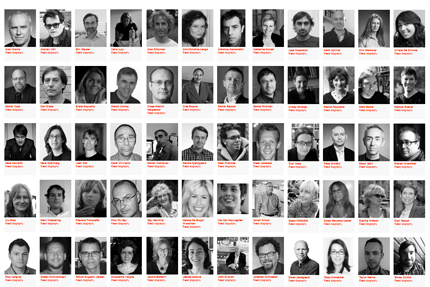Charisma was launched at the start of the year and things have been progressing very nicely we think over the past 10 months or so. The site has been consistently active, our network membership has grown steadily, and we have now accumulated over 50 posts, from a wide range of contributors, across our four themes (Markets, Consumption, Finance, Histories).
But Charisma members have also been busy offline. Liz McFall and I have encountered many of the site’s participants over the summer at a sequence of events. Overall, our strong impression is of a growing body of important, innovative work operating around the central question of how consumer markets, in all their various facets, are made, reproduced and, on occasion, unmade.
Some of this was in evidence at two events that took place in early summer in Buenos Aires and Santiago. The first, at the ISA Forum (or, to give it its full title The Second ISA Forum of Sociology: Social justice and democratization), was a panel organised by Liz, titled ‘What Makes Consumer Market Organizations?’, which alongside myself and Liz, also included Tomas Artizia, Miodrag Petrovic and Antonio Lucas & Sergio Llano. Petrovic’s paper in many ways set the scene for many of the discussions that would take place not just in this session, but over the course of the summer. Effectively, he made a strong case for the importance – and neglect – of consumer goods markets as a distinct object of study – and that this neglect is all the more surprising given the ubiquity and scale of such markets.
At and around ISA we also encountered numerous other faces that will be familiar if you’ve studied our Network page. Taylor Nelms, having arrived in Buenos Aires straight from the field, gave a fascinating, ethnographically rich paper on the process of dollarization in Ecuador – themes which he expanded on in his recent post. This in fact had some overlaps with some of the great conversations I had with Daniel Fridman (who also presented a paper on financial self-help in Argentina) and others about some of the peculiar ways in which the materiality of low value coinage really comes to matter in Argentina – trying to get hold of those pesky coins for local buses can turn into something of a headache, due to the widespread practice of ‘coin hording’, as explored in this New Yorker piece (still a problem it seems, despite the recent introduction of electronic travel passes). I won’t go into this any more here, but something for a Charisma post in future, perhaps ..
We also met up with Jose Ossandon at the ISA Forum. Jose was busy presenting at not one but two sessions (one in a session he co-organised with Dean Pierides and Daniel Fridman), as well as in a second event in Santiago – the ‘Conquering consumers: Markets encounters, knowledge and practices’ workshop put together by Tomas Artizia and held at Universidad Diego Portales. Overlapping the conversations at both events were two main questions: first, how markets–for credit, insurance as well as for goods made by companies like Apple–are made practically and second, and related to this, how consumers are ‘qualified’. Recurrent themes included the strategic deployment of forms of modelling and experimentation (for example, in my case, to target particular types of debtors or, in Jose’s, to develop a model perfectly able to tolerate a 50% debtor default rate), the bureaucratic organisation of staff (such as insurance collections agents), the specificity of particular sites (for example, the department store in Chile, the doorstep), the centrality of ongoing processes of market feedback and, as Tomas in particular explored, the active and sometimes quasi-sociological work of marketing professionals themselves, for instance in their relentless pursuit of that valuable moment of consumer ‘insight’.
These themes were taken up further by Liz and me, this time in a panel alongside Charisma steering group members Liz Moor and Zsuzsanna Vargha at the CRESC 2012 Annual Conference in Manchester. Each of us were given five minutes to present a specific consumer market problem, (with characteristic brevity we all managed this in less than 15 minutes) as a way of exploring the role – and the limits – (and indeed the helpfulness of the category) of information in consumer markets. This format was, we think, something of a success – by either focusing on the nitty gritty of an empirical case or, as in Liz Moor’s paper, going straight into the utility of the category of information itself – and with the help of a seemingly engaged audience – the conversation actually managed to do, what is often promised in panels, but also often doesn’t quite work, that is explore issues that cross cut cases and that are, hopefully, of relevance to others above and beyond our particular research interests.
Our travels also (re)highlighted to the importance of important related debates occurring elsewhere online. As has already been highlighted on the site, this includes the debates going on on Estudios de la Economía, a number of whose contributors we met in both Argentina and Chile (I also should say I particularly enjoyed Ariel Wilkis’ paper on personal credit in Argentina – a summary of which can be found on the site). And it also includes, if you can read Portuguese, Sociologia Econômica no Brasil – whose organisers we were also pleased to meet at one of the finest BBQs I’ve ever been to (in a quite different league to the standard British burnt Wall’s sausage type affair), kindly put on by Ariel. We are in the process of working out how we might collaborate in future – any suggestions welcome.
Thank you to all those who have helped with the site to date, whether practically, or by providing content for the site. Please keep things coming. (And don’t forget – we are on Twitter and Facebook too..).
